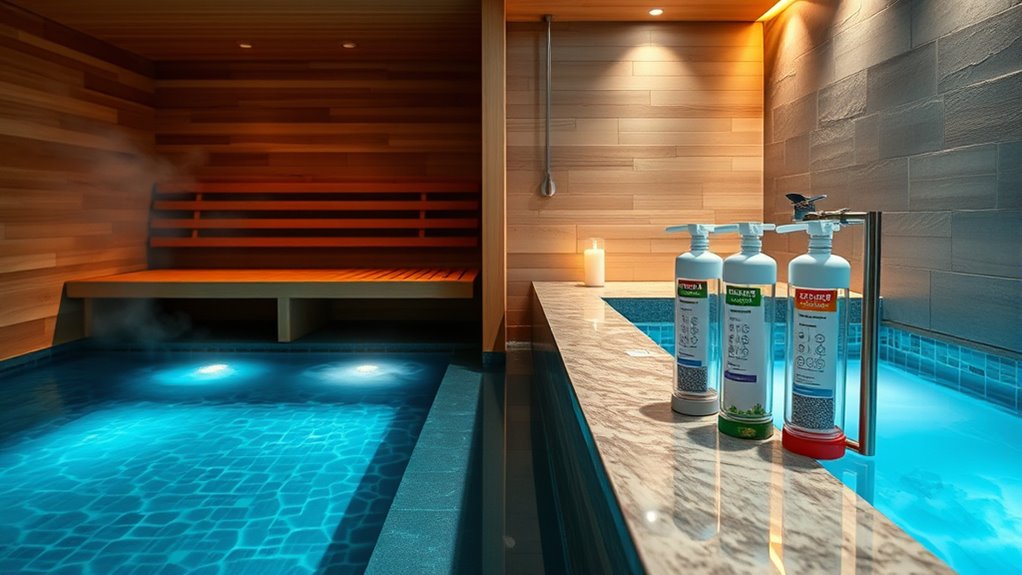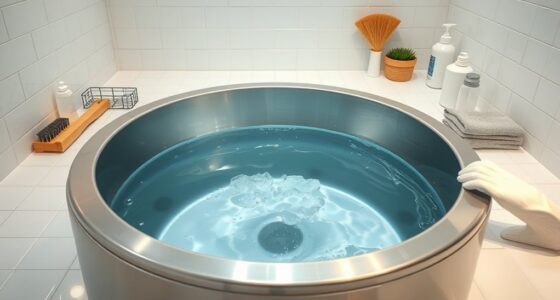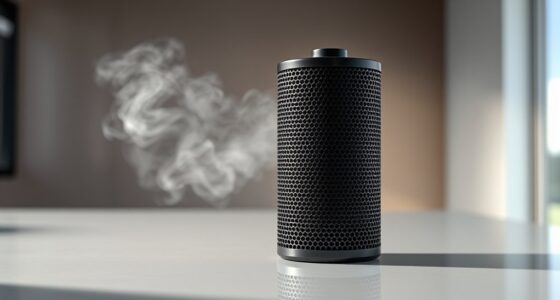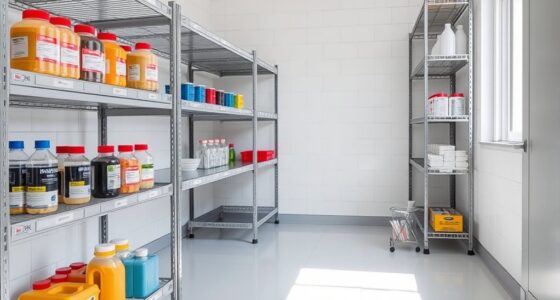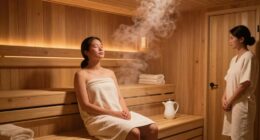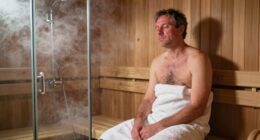To maintain water quality when combining sauna and cold plunge sessions, you should regularly filter, clean, and replace filters to keep the water clear. Balance chemicals like chlorine or bromine and monitor pH levels to prevent bacteria and algae growth. Encourage showering beforehand to minimize contaminants and avoid oils or lotions in the water. Consistent checks on water clarity and smell help catch issues early. Keep these practices in mind, and you’ll learn more tips to guarantee safe, clean water during your sessions.
Key Takeaways
- Regularly operate and maintain the filtration system to remove dirt, oils, and organic matter from the water.
- Monitor and adjust chemical levels, such as chlorine or bromine, to prevent bacteria growth and maintain water safety.
- Conduct routine water quality checks for clarity, pH, and odors to identify and address issues early.
- Encourage showering before sessions to reduce contaminants and oils introduced into the water.
- Replace filters as recommended and clean filtration components to ensure optimal performance and water cleanliness.
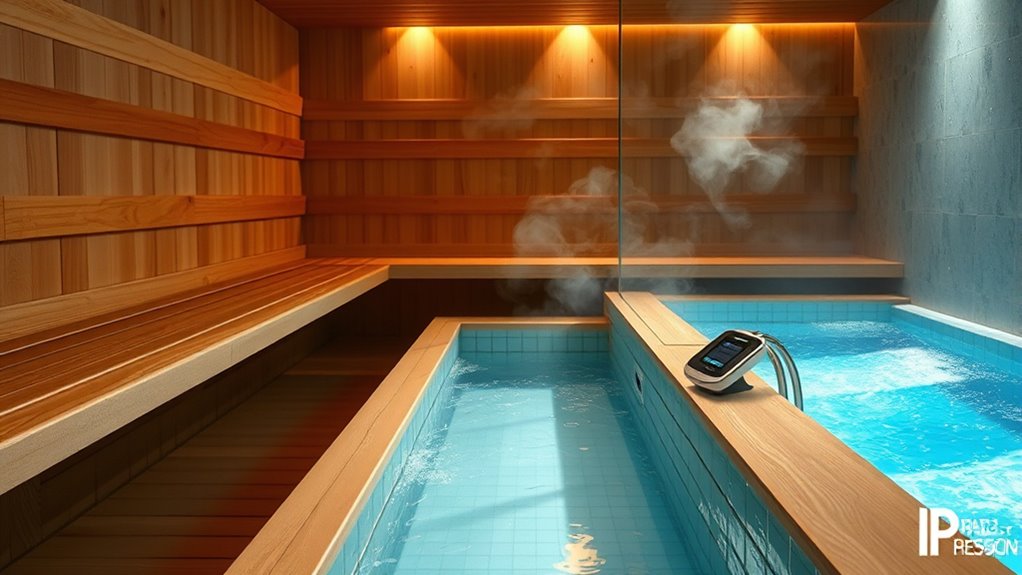
Using a sauna and cold plunge regularly can boost your health and wellness, but maintaining water quality is essential to guarantee a safe and enjoyable experience. When you’re dealing with frequent use, water filtration becomes a key component in keeping the water clean and clear. Proper filtration systems remove dirt, oils, and organic matter that can accumulate over time, preventing the growth of bacteria and algae. Investing in a reliable filtration system ensures that the water remains fresh, reducing the need for excessive chemical treatments and making your sessions more pleasant.
Chemical balancing is equally important. You need to monitor and adjust levels of sanitizers like chlorine or bromine to keep bacteria and viruses at bay. However, overuse can cause irritations or unpleasant odors, so it’s vital to maintain the right balance. Regular testing of water parameters helps you understand when to add chemicals and in what amounts. Using test strips or digital testers makes this process straightforward, allowing you to keep chemical levels within safe, recommended ranges. Proper chemical balancing not only enhances safety but also prolongs the lifespan of your sauna and plunge equipment by preventing corrosion and buildup caused by improper water chemistry.
Another aspect to consider is guaranteeing your water filtration system is functioning correctly. Clogged or worn-out filters can compromise water quality, so replacing filters according to manufacturer guidelines is crucial. Clean filters improve filtration efficiency, removing contaminants effectively and reducing the need for frequent chemical adjustments. When combined with consistent chemical balancing, a well-maintained filtration system keeps your water pristine without the hassle of constant chemical additions.
It’s also helpful to establish a routine for checking water quality. Regularly inspecting the water’s clarity, smell, and pH levels allows you to catch issues early. If you notice cloudiness, foul odors, or pH imbalances, it’s time to test and adjust your water treatment processes. By staying vigilant, you prevent problems from escalating, ensuring your sauna and plunge remain safe and inviting.
Finally, maintaining good hygiene practices—like showering before use and avoiding the introduction of oils or lotions into the water—supports your efforts to keep the water clean. Combining vigilant water filtration, precise chemical balancing, and proper hygiene creates a safe environment that maximizes the health benefits of your sauna and cold plunge sessions. In doing so, you protect your investment and enjoy a consistently refreshing, healthy experience every time. Proper filtration systems play a crucial role in maintaining optimal water quality and ensuring your wellness routine remains safe and effective.
Top picks for "maintain water quality"
Open Amazon search results for this keyword.
As an affiliate, we earn on qualifying purchases.
Frequently Asked Questions
How Often Should Water Be Tested for Contaminants?
You should test your water for contaminants at least once a week to guarantee contamination prevention. Regular water testing helps you catch any signs of bacteria, algae, or other pollutants early, especially when combining sauna and cold plunge sessions. If you notice cloudiness, bad odor, or skin irritation, test the water immediately. Consistent testing keeps your water clean and safe, allowing you to enjoy your sessions without worries.
What Are the Signs of Water Quality Deterioration?
You’ll notice water quality deterioration when algae growth overtakes your pool, turning it into a murky swamp, or if the water’s pH balance spirals out of control, making it feel almost corrosive. Signs include a foul smell, slimy surfaces, cloudiness, and skin irritation after use. Keep an eye on these indicators, as they signal your water’s health is declining and needs immediate attention to prevent further issues.
Can Water Disinfectants Affect Skin or Health?
Disinfectant residue in water can affect your skin or health, especially if you have skin sensitivity. Some chemicals used for disinfection, like chlorine or bromine, may cause irritation or allergic reactions. To minimize risks, guarantee proper water testing and maintaining recommended disinfectant levels. If you notice skin discomfort or irritation after your sessions, consider reducing chemical concentrations or using alternative disinfection methods to protect your skin and overall health.
What Are Eco-Friendly Options for Water Maintenance?
You can choose eco-friendly water maintenance options like natural filtration systems and biodegradable treatments. Natural filtration uses plants or mineral filters to keep water clean without chemicals, while biodegradable treatments break down safely and reduce environmental impact. These methods help maintain water quality effectively, ensuring your sauna and cold plunge sessions stay safe and eco-conscious. Switching to these options minimizes chemical use and supports sustainability.
How Does Temperature Fluctuation Impact Water Chemistry?
Irony strikes when you think temperature swings are harmless, but they actually disrupt thermal stability and throw off your chemical balance. Sudden changes can cause pH levels to fluctuate and promote bacterial growth. To keep water clean and safe, you need to monitor and stabilize temperatures carefully. Maintaining consistent thermal stability guarantees your water chemistry stays balanced, so your sauna and cold plunge sessions remain both enjoyable and hygienic.
Conclusion
To keep your water pristine, stay vigilant with regular cleaning and monitoring. Think of your water as the heartbeat of your wellness routine—neglect it, and everything suffers. By maintaining proper sanitation, you’re not just protecting the water, but ensuring your health and relaxation remain uninterrupted. Remember, a clean water system isn’t just a detail; it’s the foundation of your rejuvenating experience. Don’t let neglect turn your sanctuary into a source of worry—keep it pure, keep it safe.
